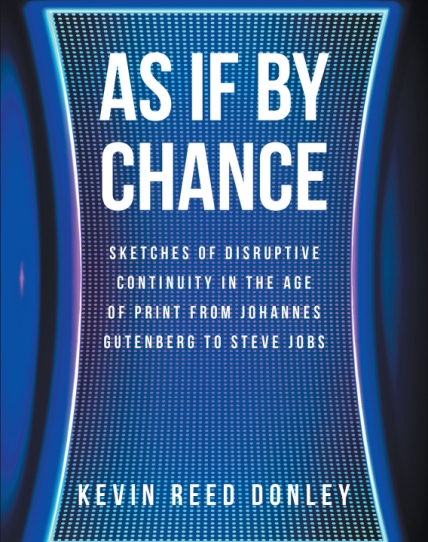
Southfield, MI, January 27, 2024 — Fulton Books author Kevin Reed Donley—who has worked in the graphic arts, publishing, and printing industries in the Detroit area for over forty years—has completed his most recent book, “As if by Chance: Sketches of Disruptive Continuity in the Age of Print from Johannes Gutenberg to Steve Jobs”: a fascinating look at the evolution of printing technology since the time of Gutenberg and the resonating relevance of this history for the modern digital age.
Born and raised in Point Pleasant, New Jersey, author Kevin Reed Donley graduated from Rutgers University with a degree in Bachelor of Arts in Graphic Design in 1982, after which he relocated to Detroit to start his professional career. In 1997, Kevin became a certified business planning executive with the National Association for Printing Leadership Management Institute at Northwestern University.
The author is active in the Detroit and Michigan graphic arts and printing community and has also been an active participant in the national and international technical standards initiatives of the printing industry. Donley is a speaker on printing business and technology topics, having addressed audiences at colleges and universities and industry events for more than three decades. In 2008, he launched a blog called “Multimediaman: Know the Past, Create the Future” at multimediaman.net and published studies of major innovators in the history of print technology as well as reviews of contemporary developments in new electronic and digital media.
“This book discusses these two bookends in the age of print,” writes Donley. “It follows the transitions and stages of innovation in printing between the fifteenth and twenty-first centuries and shows how the inventors responsible for this progress are bound together in a chain of revolutionary technical change called disruptive continuity.
“While the works of Gutenberg and Jobs are separated by more than five centuries, there are striking parallels and differences between these two innovations. They both sparked the quantitative expansion of literacy and the spread of knowledge around the world. However, the emergence of electronic publishing—especially in its present-day social media forms—has brought a vast increase in the consumption of information while also heralding a qualitative transformation that places the tools of wireless and mobile multimedia publishing into the hands of billions of people on earth.
“Much in the same way that there was a historical lag between Gutenberg’s invention and the full impact of printing on the world, so too in our own time, the long-term societal consequences of electronic publishing have yet to be realized.”


+ There are no comments
Add yours